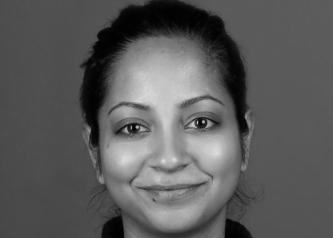

Neubauer Family Assistant Professor, Department of Human Genetics
Dr. Maanasa Raghavan examines how demographic, cultural, and environmental factors contributed over time to shaping the genetic landscape of present-day human populations through her work with ancient DNA. Her lab brings together genome-scale data from present-day and ancient humans and their biotic environment, especially domesticates and pathogens, thereby contributing towards the understanding of the evolutionary mechanisms that underlie adaptations and diseases among human populations. Current projects in the lab focus on genetic histories of humans and their diseases in South Asia, the Americas, and the Middle East, all set within a multi-disciplinary and community-engaged framework.
Since 2019, Raghavan has worked with a team of archaeologists and scientists in India, Pakistan, and Sri Lanka to develop diverse research tools for studying human evolution in South Asia. Raghavan and her lab have also worked in partnership with researchers in Chile to review the correlation between cultural and genetic evolution and explore the complex discourse around mestizaje (mixed cultural and ethnic heritage or race) and its consequences for local Indigenous communities. She recently started a new project examining a collection of human skulls from sacrificial contexts from Anyang, Henan Province, China, aimed at developing our understanding of the social structure and genetic diversity of the Shang population (~1200-1000 BCE).
Q&A
Q: Why is international collaboration important in your field of study?
A: Movements and mixing are pervasive in human (pre)history and have shaped genetic variation in present-day humans. Consequently, global perspectives and partnerships – both with researchers and local communities - are essential to the reconstruction of our biological origins.
Q: What has interested or surprised you most in building your international collaborations?
A: Human origins can be a sensitive topic for many and this research requires thoughtful ways of building and sustaining collaborations, whether it is with international researchers, Indigenous communities, or local governments. Taking the time to foster ethical and transparent partnerships at each of these levels has been fulfilling and enriching for me both as a researcher and a global citizen.